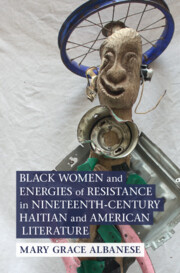Book contents
- Black Women and Energies of Resistance in Nineteenth-Century Haitian and American Literature
- Cambridge Studies in American Literature and Culture
- Black Women and Energies of Resistance in Nineteenth-Century Haitian and American Literature
- Copyright page
- Contents
- Figures
- Acknowledgments
- Introduction
- Chapter 1 Powering the Soul
- Chapter 2 Marie Laveau’s Generational Arts
- Chapter 3 Freedom’s Conduit
- Chapter 4 “A Wandering Maniac”
- Chapter 5 Mesmeric Revolution
- Coda
- Bibliography
- Index
- Recent books in this series (continued from page )
Chapter 4 - “A Wandering Maniac”
Sojourner Truth’s Demonic Marronage
Published online by Cambridge University Press: 09 November 2023
- Black Women and Energies of Resistance in Nineteenth-Century Haitian and American Literature
- Cambridge Studies in American Literature and Culture
- Black Women and Energies of Resistance in Nineteenth-Century Haitian and American Literature
- Copyright page
- Contents
- Figures
- Acknowledgments
- Introduction
- Chapter 1 Powering the Soul
- Chapter 2 Marie Laveau’s Generational Arts
- Chapter 3 Freedom’s Conduit
- Chapter 4 “A Wandering Maniac”
- Chapter 5 Mesmeric Revolution
- Coda
- Bibliography
- Index
- Recent books in this series (continued from page )
Summary
Chapter 4, “‘A Wandering Maniac’: Sojourner Truth’s Demonic Marronage” turns to a prophet seldom associated with the Caribbean. Yet Sojourner Truth, who was born in 1797 in the predominantly Dutch Ulster County, grew up in a world shaped by Atlantic empires; steeped in African, Native American, Caribbean, Spanish, Dutch, and French histories; and shaking with the tremors of the Haitian Revolution. Her first language was Dutch, her early spiritual beliefs were African, and her community was influenced by transatlantic and Caribbean channels of trade, labor, and revolution. This chapter examines the energy practices of Truth’s creolized milieu within a broader discourse on Truth’s celebrated mobility, historicizing her fugitivity within a transnational history of female marronage throughout the Americas. This hemispheric history of wandering evokes what Sylvia Wynter has understood as the “demonic grounds” of Black women’s liberation. Suturing the demonic (an energy force that emerges from Wynter’s critique of nineteenth-century physics) with Caribbean practices of marronage (a kinetic practice of flight against the immobilizing energy demands of chattel slavery), Truth, I argue, not only is an Atlantic subject but also expands critical understandings of twentieth- and twenty-first-century Caribbean philosophy and specifically Black women’s energy in the Americas.
Keywords
- Type
- Chapter
- Information
- Black Women and Energies of Resistance in Nineteenth-Century Haitian and American Literature , pp. 100 - 133Publisher: Cambridge University PressPrint publication year: 2023

